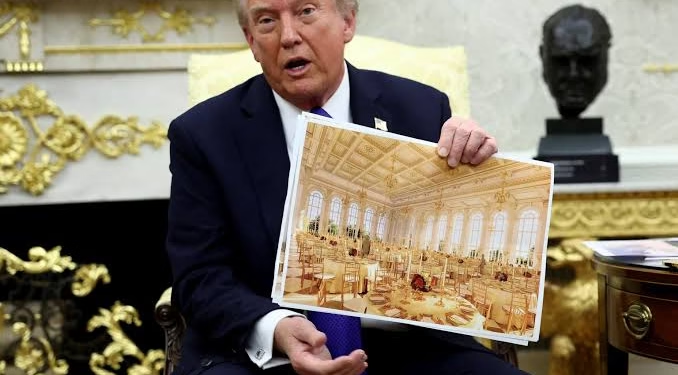Ripple, Coinbase, and Tether are among roughly 40 private donors funding a 90,000-square-foot White House ballroom expansion on the East Wing grounds, marking the first time major cryptocurrency companies have contributed to construction at the presidential residence.
The project, which began earlier this month and is expected to be completed before the end of President Donald Trump’s current term, has drawn criticism from lawmakers including Senator Elizabeth Warren, who called it a potential “pay-for-access” arrangement.
The Trump administration maintains the privately funded expansion will cost taxpayers nothing and complies with federal ethics standards, though the total budget and individual donation amounts have not been disclosed.
“This is a moment that shows how far digital finance has come from being seen as fringe technology to helping fund the nation’s most iconic political residence,” said Ari Redbord, Head of Policy at TRM Labs, in a comment to Reuters.
Crypto firms join elite donor list
The White House ballroom donor list features roughly 40 corporations and high-profile individuals, including tech giants like Amazon, Google, and defense contractor Lockheed Martin. Yet the participation of Coinbase, Ripple, and Tether stands out as a first in White House donation history.
Coinbase, under the leadership of CEO Brian Armstrong, has spent much of 2024 pushing for federal crypto legislation and clarity on securities definitions. Ripple, led by Brad Garlinghouse, has actively deepened its D.C. ties Garlinghouse reportedly met with Trump at a blockchain policy summit earlier this year.
Tether’s U.S. division, Tether America, joined the White House ballroom effort as the stablecoin sector gains traction in mainstream finance. Analysts view the trio’s participation as a milestone signaling crypto’s arrival in the heart of U.S. policymaking.
Seeing major crypto firms contribute to a project as visible as the White House ballroom signals a new era of normalization for the industry, said Sheila Warren, CEO of the Crypto Council for Innovation, in a statement.
Reports suggest that corporate donors may receive symbolic acknowledgments, such as engraved plaques or dedicated fixtures within the ballroom’s architecture. Other names on the list include the Winklevoss twins, founders of Gemini, known for their consistent advocacy of blockchain innovation and digital assets regulation.
Supporters praise innovation, critics warn of conflicts
While supporters frame the White House ballroom initiative as a forward-looking partnership between public institutions and private innovators, critics argue it risks blurring the line between influence and access.
Senator Elizabeth Warren and former Secretary of State Hillary Clinton have both expressed concern that the donor model could amount to “pay-for-access” politics. Preservation groups have gone further, filing a lawsuit to delay construction over transparency and historical integrity concerns.
Still, the Trump administration maintains that the White House ballroom expansion represents a model for future public-private collaborations. Officials have emphasized that the project is fully compliant with federal ethics standards and subject to ongoing oversight.
The key is transparency, said David Primo, a political economist at the University of Rochester. When companies like Ripple or Coinbase fund a project at the White House, the public deserves clarity about what, if anything, they’re receiving in return.
A turning point for crypto’s Washington ambitions
The White House ballroom project coincides with a broader shift in U.S. crypto policy. Recent executive actions ranging from blockchain research funding to the regulatory recognition of stablecoins reflect an administration increasingly open to digital innovation.
Coinbase’s Armstrong recently stated that a new crypto market structure bill is “90% complete,” fueling speculation that the U.S. may soon establish one of the most comprehensive digital asset frameworks globally.
Meanwhile, Trump’s public endorsement of blockchain technology and the recent pardon of former Binance founder Changpeng Zhao have further signaled a pivot toward pro-innovation sentiment at the highest levels.
Industry observers say the White House ballroom funding effort encapsulates that evolution. Once outsiders, crypto firms are now financially supporting one of America’s most symbolic landmarks which is a development unthinkable just a few years ago.
This represents the normalization of crypto in U.S. governance, said Noelle Acheson, market strategist and author of Crypto Is Macro Now.
The fact that Coinbase, Ripple, and Tether are contributing to the White House ballroom is as much about symbolism as substance as it shows crypto is now part of the establishment conversation.











